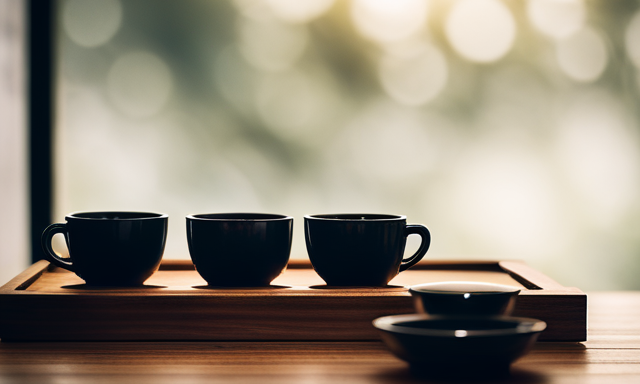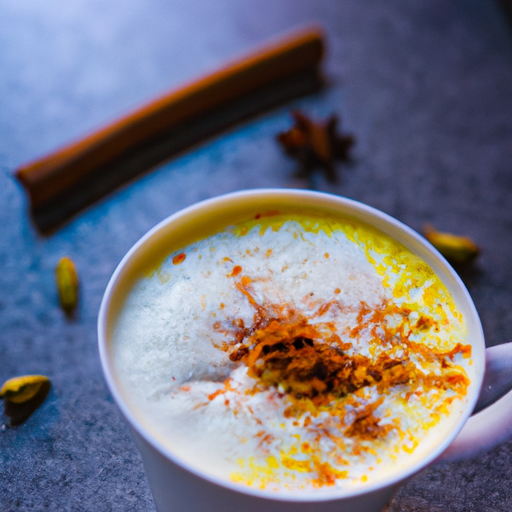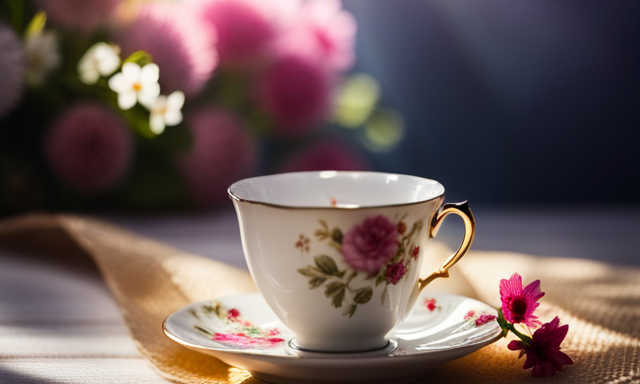I know what you’re thinking. How many cups of oolong tea can I actually have without going overboard? Well, I’m here to provide you with some evidence-based information to help you make an informed decision.
Oolong tea has gained popularity for its numerous health benefits, but it’s important to understand the recommended daily intake to ensure you’re reaping the advantages without any potential drawbacks.
In this article, we’ll explore the benefits of oolong tea for your health, discuss the caffeine content, and delve into the factors to consider for your personal health and sensitivity. We’ll also touch on the potential side effects of excessive consumption and provide brewing tips for that perfect cup.
So, if you’re curious about how many cups of oolong tea are healthy, keep reading to discover all you need to know.
Key Takeaways
- Oolong tea contains caffeine, but in lower amounts compared to black tea or coffee.
- Oolong tea aids in weight loss by boosting metabolism and reducing fat absorption.
- Oolong tea’s antioxidant properties may improve heart health by reducing cholesterol levels.
- Oolong tea promotes digestion and can alleviate digestive issues.
Benefits of Oolong Tea for Health
You’ll be amazed at the numerous health benefits of drinking oolong tea! This delicious beverage has been praised for its ability to aid in weight loss and promote heart health.
Oolong tea contains polyphenols, which have been shown to boost metabolism and increase fat oxidation, making it a great addition to any weight loss regimen.
Additionally, the antioxidants found in oolong tea can help reduce the risk of heart disease by improving cholesterol levels and reducing inflammation.
It’s important to note that while oolong tea can provide health benefits, moderation is key. To fully understand the caffeine content in oolong tea and its potential effects on your health, let’s dive into the next section.
Understanding the Caffeine Content in Oolong Tea
Indulging in the delicious world of oolong tea is like embarking on a caffeine-filled adventure; understanding its caffeine content is crucial.
Oolong tea falls in the middle of the caffeine spectrum, with approximately 37 milligrams per 8-ounce cup, compared to black tea’s 47 milligrams and green tea’s 28 milligrams. This moderate caffeine content makes oolong tea a great choice for those looking for a pick-me-up without the jitters.
Additionally, oolong tea is packed with health benefits, including boosting metabolism, improving heart health, and aiding digestion. However, it’s important to note that individual caffeine sensitivity may vary.
As we move into the next section about the recommended daily intake of oolong tea, we can explore how to enjoy this flavorful beverage while maintaining a healthy balance.
Recommended Daily Intake of Oolong Tea
Discover the perfect balance of oolong tea in your daily routine and savor its delightful flavors while maintaining a well-rounded lifestyle.
When it comes to the recommended intake of oolong tea, it’s important to consider your individual needs and health goals. Generally, drinking 2-3 cups of oolong tea per day is considered a healthy amount. This moderate intake allows you to enjoy the numerous health benefits that oolong tea offers.
Oolong tea is rich in antioxidants, which help to reduce inflammation and support overall well-being. It also contains caffeine, which can provide a gentle energy boost without the jitters associated with coffee. However, it’s important to be mindful of your own personal health and sensitivity. Factors such as caffeine sensitivity or pre-existing health conditions may require you to adjust your oolong tea intake accordingly.
Factors to Consider for Personal Health and Sensitivity
Taking into account individual needs and health goals, it’s crucial to consider factors such as personal health and sensitivity when incorporating oolong tea into your daily routine. Factors to consider include your overall health, any existing medical conditions, and your sensitivity to caffeine. Oolong tea contains caffeine, although in lower amounts compared to other types of tea. If you are sensitive to caffeine or have certain health conditions such as anxiety, high blood pressure, or insomnia, it may be wise to limit your oolong tea consumption. Additionally, it’s important to remember that moderation is key. A general guideline is to consume no more than 2-3 cups of oolong tea per day. However, it’s always best to consult with a healthcare professional to determine the appropriate amount for your specific circumstances. Incorporating oolong tea into a balanced diet can provide numerous health benefits, which will be discussed in the next section.
Oolong Tea as Part of a Balanced Diet
Incorporating oolong tea into your daily meals can contribute to a well-rounded and nourishing diet. Oolong tea has been associated with potential weight loss benefits, as it may help boost metabolism and increase fat oxidation. Additionally, oolong tea contains compounds that can support healthy digestion, such as polyphenols and catechins, which have been shown to have anti-inflammatory and antioxidant effects.
When consuming oolong tea as part of a balanced diet, it’s important to consider individual factors such as sensitivity to caffeine and any potential interactions with medications. As a general guideline, it’s recommended to consume oolong tea in moderation, typically 2-3 cups per day. However, it’s always best to consult with a healthcare professional to determine the amount that’s appropriate for your specific needs and health goals.
Transitioning into the subsequent section about potential side effects of excessive oolong tea consumption, it’s important to be aware of the potential risks associated with consuming too much oolong tea.
Potential Side Effects of Excessive Oolong Tea Consumption
Beware of overindulging in oolong tea, as excessive consumption can lead to potential side effects. While oolong tea has numerous health benefits, it is important to consume it in moderation to avoid any negative consequences. Some potential risks of excessive oolong tea consumption include caffeine sensitivity, digestive issues, and mineral imbalances. Long term effects may also include increased risk of osteoporosis and dental problems due to the tea’s tannin content. To maintain a balanced and healthy lifestyle, it is recommended to limit oolong tea intake to a moderate amount. As with any food or beverage, it is crucial to listen to your body and adjust your consumption accordingly. Now let’s delve into the exciting world of varieties and flavors of oolong tea.
Varieties and Flavors of Oolong Tea
Explore the wonderful world of oolong tea by discovering its wide range of varieties and delightful flavors that’ll captivate your taste buds.
Oolong tea comes in different varieties, each offering its unique taste and aroma. From light and floral to rich and roasted, there’s an oolong tea for every tea lover. Some popular varieties include Tie Guan Yin, Da Hong Pao, and Oriental Beauty. Each variety is carefully crafted using specific processing techniques to bring out the best flavors.
Whether you prefer a smooth and mellow cup or a bold and robust one, oolong tea has something for everyone. The selection of oolong tea is endless, allowing you to experiment and find your perfect brew.
As you delve into the world of oolong tea, you’ll soon discover the brewing techniques that bring out the true essence of this remarkable beverage. Stay tuned to learn the brewing tips for the perfect cup of oolong tea and elevate your tea experience.
Brewing Tips for the Perfect Cup of Oolong Tea
To achieve tea nirvana, master the art of brewing oolong by finding the perfect balance between water temperature and steeping time. Brewing techniques can vary depending on the type and grade of oolong tea. Generally, a water temperature of 190-200°F (88-93°C) works well for most oolong teas. Steeping time can range from 3-5 minutes, but it’s always best to follow the instructions provided with your specific tea. To keep you engaged, let’s explore the different grades of oolong tea in a table:
| Grade | Description | Example |
|---|---|---|
| Fine | Highly aromatic, delicate flavor | Tie Guan Yin |
| Standard | Balanced flavor and aroma | Da Hong Pao |
| Commercial | Robust flavor, suitable for blending | Jin Xuan |
| Flavored | Infused with additional flavors like fruit or flowers | Mango Oolong |
Now, let’s move on to frequently asked questions about oolong tea and health, shall we?
Frequently Asked Questions about Oolong Tea and Health
Now that you know how to brew the perfect cup of oolong tea, let’s dive into some frequently asked questions about oolong tea and its health benefits. Oolong tea is known for its numerous health benefits, which make it a popular choice among tea enthusiasts. Here are some commonly asked questions about oolong tea and its impact on health:
- Does oolong tea help with weight loss?
- Can oolong tea improve heart health?
- Does oolong tea contain caffeine?
- Is oolong tea beneficial for digestion?
Oolong tea has been found to aid in weight loss by boosting metabolism and reducing fat absorption. Its antioxidant properties may also improve heart health by reducing cholesterol levels. While oolong tea does contain caffeine, it is generally lower than that of black tea or coffee. Lastly, oolong tea can promote digestion and alleviate digestive issues. Incorporating oolong tea into your daily routine can provide you with these potential health benefits.
Frequently Asked Questions
Can oolong tea help with weight loss?
Oolong tea has been associated with increased metabolism and appetite suppression, potentially aiding in weight loss. However, it is important to note that individual results may vary and incorporating oolong tea into a balanced diet and exercise routine is key.
Does oolong tea contain antioxidants?
Yes, oolong tea contains antioxidants that offer various health benefits. Research suggests that these antioxidants can help reduce inflammation, improve heart health, and boost the immune system.
Can oolong tea help with digestion?
Oolong tea has been shown to improve gut health and reduce bloating. It contains compounds that aid digestion and promote the growth of beneficial gut bacteria. Incorporating moderate amounts of oolong tea into your daily routine can be beneficial.
Is it safe to consume oolong tea during pregnancy?
During pregnancy, it is generally safe to consume oolong tea in moderation. However, it is important to consult with a healthcare provider as there may be potential risks associated with excessive consumption.
Can oolong tea help lower cholesterol levels?
Oolong tea has been shown to have potential benefits for heart health. Studies suggest that it can help lower cholesterol levels and regulate blood pressure. However, it is important to consume it in moderation and consult with a healthcare professional.
Conclusion
In conclusion, oolong tea can be a healthy addition to your daily routine. It has numerous health benefits, such as supporting weight loss, boosting metabolism, and improving heart health. However, it’s important to consider your personal health and sensitivity to caffeine before indulging in multiple cups a day. Remember, balance is key! So go ahead and enjoy a cup of this delicious and beneficial beverage, but don’t go overboard and drink gallons of it – moderation is always the best approach. Trust me, your body will thank you for it!










